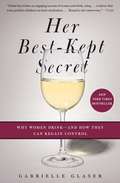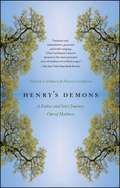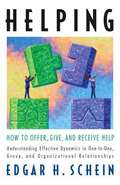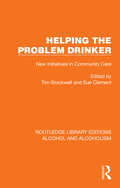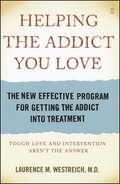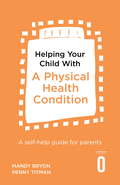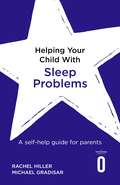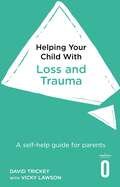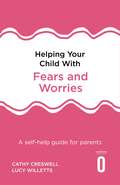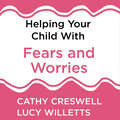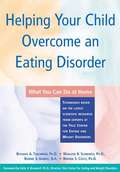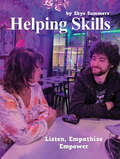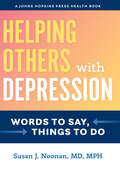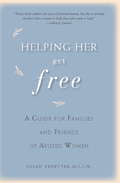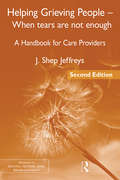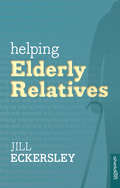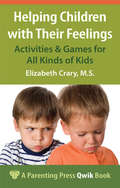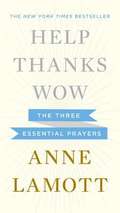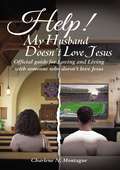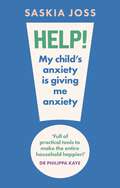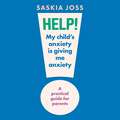- Table View
- List View
Her Best-Kept Secret: Why Women Drink-And How They Can Regain Control
by Gabrielle GlaserFor readers of Quit Like a Woman, this &“engaging account of women and drink, [cites] fascinating studies about modern stressors…and evidence that some problem drinkers can learn moderation….Bound to stir controversy&” (People).In Her Best-Kept Secret, journalist Gabrielle Glaser uncovers a hidden-in-plain-sight drinking epidemic. Using “investigative rigor and thoughtful analysis” (The Boston Globe), Glaser is the first to document that American women are drinking more often than ever and in ever-larger quantities in this “substantial book, interested in hard facts and nuance rather than hand-wringing” (The New York Times Book Review). She shows that contrary to the impression offered on reality TV, young women alone aren’t driving these statistics—their moms and grandmothers are, too. But Glaser doesn’t wag a finger. Instead, in a funny and tender voice, Glaser looks at the roots of the problem, explores the strange history of women and alcohol in America, drills into the emerging and counterintuitive science about that relationship, and asks: Are women getting the help they need? Is it possible to return from beyond the sipping point and develop a healthy relationship with the bottle? Glaser reveals that, for many women, joining Alcoholics Anonymous is not the answer—it is part of the problem. She shows that as scientists and health professionals learn more about women’s particular reactions to alcohol, they are coming up with new and more effective approaches to excessive drinking. In that sense, Glaser offers modern solutions to a very modern problem.
Henry's Demons: Living with Schizophrenia, A Father and Son's Story
by Patrick Cockburn Henry CockburnOn a cold February day two months after his twentieth birthday, Henry Cockburn waded into the Newhaven estuary outside Brighton, England, and nearly drowned. Voices, he said, had urged him to do it. Nearly halfway around the world in Afghanistan, journalist Patrick Cockburn learned from his wife, Jan, that his son had suffered a breakdown and had been admitted to a hospital. Ten days later, Henry was diagnosed with schizophrenia. Narrated by both Patrick and Henry, this is the extraordinary story of the eight years since Henry's descent into schizophrenia--years he has spent almost entirely in hospitals--and his family's struggle to help him recover. With remarkable frankness, Patrick writes of Henry's transformation from art student to mental patient and of the agonizing and difficult task of helping his son get well. Any hope of recovery lies in medication, yet Henry, who does not believe he is ill, secretly stops taking it and frequently runs away. Hopeful periods of stability are followed by frightening disappearances, then relapses that bleed into one another, until at last there is the promise of real improvement. In Henry's own raw, beautiful chapters, he describes his psychosis from the inside. He vividly relates what it is like to hear trees and bushes speaking to him, voices compelling him to wander the countryside or live in the streets, the loneliness of life within hospital walls, harrowing "polka dot days" that incapacitate him, and finally, his steps towards recovery. Patrick's and Henry's parallel stories reveal the complex intersections of sanity, madness, and identity; the vagaries of mental illness and its treatment; and a family's steadfast response to a bewildering condition. Haunting, intimate, and profoundly moving, their unique narrative will resonate with every parent and anyone who has been touched by mental illness.
Helping: How to Offer, Give, and Receive Help
by Edgar H. ScheinIn this seminal book on helping, corporate culture and organizational development guru Ed Schein analyzes the dynamics of helping relationships, and explains why help is often not helpful.
Helping the Problem Drinker: New Initiatives in Community Care (Routledge Library Editions: Alcohol and Alcoholism)
by Tim StockwellOriginally published in 1987, Helping the Problem Drinker addressed the realisation that only a small proportion of problem drinkers ever contacted existing treatment agencies, and that therefore a more comprehensive community-oriented approach should be developed. This included training of primary care health workers and the development of multidisciplinary Community Alcohol Teams. At the time other community-based initiatives such as self-help groups for early problem drinkers and early intervention programmes in general practice and general hospitals, had been implemented. This book draws together what had been learned about these new developments, a number of which had now been evaluated. The book will still be of interest to all planners and professional staff concerned with alcohol problems: both specialists and non-specialists in general medicine, psychiatry, psychology and the social services.
Helping the Addict You Love: The New Effective Program for Getting the Addict into Treatment
by Laurence WestreichIt's okay to love them. It's your right to help them. Addiction destroys people and can even end lives. When you know or suspect that someone you love is suffering from addiction you have two goals: getting your loved one into treatment and turning that treatment into full-fledged sobriety. Many addiction experts tell you that you have to disengage or risk being an enabler, a codependent bystander, in the wreckage of an addict's life; that you have to cut all ties or be taken advantage of financially and emotionally; that you have to protect yourself from your loved one, who isn't the person you used to know. But many friends and family members find it unnatural, even impossible, to turn away from a person they love who is at his lowest point, and refuse to believe that their addict is lost to addiction. Backed by his years of experience, Dr. Westreich guides you through the process of getting the addict you love on the road to treatment and recovery. He provides detailed scripts to lead you through pivotal conversations with the addict in your life, highlighting the words that he's found to be most effective and the words to avoid. With this book in hand, family and friends will know, for example, how to motivate their addict to recognize his problem based on the addict's own definition of what addiction looks like; how to "raise the bottom" that addicts so often must hit to a more acceptable level -- such as embarrassment, job loss, or ill health; and when to use gentle disagreement, quiet listening, or forceful confrontation to move the addict toward treatment, while managing and protecting their own emotions. Dr. Westreich also shows you how to engage a therapist in the process and provides methods for combating an addict's defense mechanisms. By outlining several treatment options, he helps you to weigh what each can and cannot accomplish, which is the most effective treatment for the kind of addiction you are dealing with, what each treatment requires of the recovering addict and the friend or family member, and how successful each is. Dr. Westreich also takes care to discuss the kinds of special situations you may face when the addict in your life, in addition to having a substance abuse problem, is a minor, is pregnant, has mental or medical diseases, or has other issues that are likely to affect recovery. Helping the Addict You Love is the guide that so many loved ones of addicts have desperately needed. Dr. Westreich supports you through the emotional process of helping the addict you love, tells you it's okay to want to help, and teaches you how to do so.
Helping Your Child with a Physical Health Condition: A self-help guide for parents (Helping Your Child)
by Penny Titman Mandy BryonHas your child received a medical diagnosis for a long term illness or health condition?If so, this can be a stressful time for you both. You may have noticed changes in your relationship and behaviour towards your child. For example many parents feel that their child needs more understanding, is more fragile or is struggling to cope physically or emotionally. Your discipline parenting style may change if you feel that they 'suffer enough' already. Parents often find their confidence and judgement gets knocked off track in the early stages following a diagnosis, but given time and support, they do adapt and develop resilience in themselves and in their child.This book can help you with: · Emotional support for managing difference and dealing with difficult behaviour· Practical suggestions for easing hospital anxiety or navigating feeding problems· Advice on what to say and when to your child about their illness· How to ensure you don't neglect yourself or the rest of your familyWritten by experts in childhood illness, this step-by-step guide is for any parent who feels isolated or lacking in support.Helping Your Child is a series for parents and caregivers to support children through developmental difficulties, both psychological and physical. Each guide uses clinically proven techniques.Series editors: Professor Peter Cooper and Dr Polly Waite
Helping Your Child with Sleep Problems: A self-help guide for parents (Helping Your Child)
by Rachel Hiller Michael GradisarDoes your child have trouble getting to sleep? Are they worried about being left alone?Sleep problems are a common issue for school-aged children and can be a stressful situation for child and parent alike. But whether your child suffers from bedtime separation anxiety, insomnia or night-terrors, or simply refuses to sleep in their own bed, this book can help.Written by expert authors with experience of treating childhood sleep disorders, this easy to read manual uses tried and trusted techniques from cognitive behavioural therapy (CBT) to help everyone have a better night's sleep, including:· Using sleep diaries to set a sleep routine that helps your child fall asleep quicker· Proven methods for helping your child to face their worries around bedtime· Strategies for dealing with bedwetting, night terrors and sleepwalkingThis step-by-step guide to establishing better sleep patterns will help you become a sleep therapist for your child! Helping Your Child is a series for parents and caregivers to support children through developmental difficulties, both psychological and physical. Each guide uses clinically-proven techniques.Series editors: Professor Peter Cooper and Dr Polly Waite
Helping Your Child with Loss and Trauma: A self-help guide for parents (Helping Your Child)
by Vicky Lawson David TrickeyIs your child struggling to cope with a loss or trauma?Although loss and change are inevitable parts of life, some children find such events overwhelming and in some cases they can become traumatised by them.This essential guide provides informed advice for parents about how to support your children when they encounter difficulties with bereavement and trauma. Research has indicated that children are less likely to develop problems such as Post-Traumatic Stress Disorder (PTSD) if they are provided with the appropriate support and opportunities to talk about difficult events and their impact on them. This book will give you step-by-step practical strategies to:· Understand the potential impact of loss and trauma on your children· Provide the best environment for recovery after traumatic events· Help your child get back on trackHelping Your Child is a series for parents and caregivers to support children through developmental difficulties, both psychological and physical. Each guide uses clinically proven techniques.Series editors: Dr Polly Waite and Emeritus Professor Peter Cooper
Helping Your Child with Loss and Trauma: A self-help guide for parents (Helping Your Child)
by Vicky Lawson David TrickeyIs your child struggling to cope with a loss or trauma?Although loss and change are inevitable parts of life, some children find such events overwhelming and in some cases they can become traumatised by them.This essential guide provides informed advice for parents about how to support your children when they encounter difficulties with bereavement and trauma. Research has indicated that children are less likely to develop problems such as Post-Traumatic Stress Disorder (PTSD) if they are provided with the appropriate support and opportunities to talk about difficult events and their impact on them. This book will give you step-by-step practical strategies to:· Understand the potential impact of loss and trauma on your children· Provide the best environment for recovery after traumatic events· Help your child get back on trackHelping Your Child is a series for parents and caregivers to support children through developmental difficulties, both psychological and physical. Each guide uses clinically proven techniques.Series editors: Dr Polly Waite and Emeritus Professor Peter Cooper
Helping Your Child with Fears and Worries 2nd Edition: A self-help guide for parents (Helping Your Child)
by Lucy Willetts Cathy CreswellPREVIOUSLY PUBLISHED AS OVERCOMING YOUR CHILD'S FEARS AND WORRIESDoes your child suffer from fears and worries that affect their behaviour or keep them awake at night?Fears and worries are very common among children with around 15% thought to suffer from anxiety disorders; the most commonly identified emotional or behavioural problems among children. However, if left unchecked, they can cause more serious problems such as school avoidance, difficulties in making friends and long-term problems with anxiety and depression. Written by two of the UK's foremost experts on childhood anxiety, this extremely useful guide will enable you to understand what is causing your child's worries and to carry out step-by-step practical strategies to help him or her to overcome them, including:· Addressing specific fears and phobias as well as general anxiety and 'worrying'· Using case studies, worksheets and chartsHelping Your Child is a series for parents and caregivers to support children through developmental difficulties, both psychological and physical. Each guide uses clinically-proven techniques.Series editors: Professor Peter Cooper and Dr Polly Waite
Helping Your Child with Fears and Worries 2nd Edition: A self-help guide for parents (Helping Your Child)
by Lucy Willetts Cathy CreswellPREVIOUSLY PUBLISHED AS OVERCOMING YOUR CHILD'S FEARS AND WORRIESDoes your child suffer from fears and worries that affect their behaviour or keep them awake at night?Fears and worries are very common among children with around 15% thought to suffer from anxiety disorders; the most commonly identified emotional or behavioural problems among children. However, if left unchecked, they can cause more serious problems such as school avoidance, difficulties in making friends and long-term problems with anxiety and depression. Written by two of the UK's foremost experts on childhood anxiety, this extremely useful guide will enable you to understand what is causing your child's worries and to carry out step-by-step practical strategies to help him or her to overcome them, including:· Addressing specific fears and phobias as well as general anxiety and 'worrying'· Using case studies, worksheets and chartsHelping Your Child is a series for parents and caregivers to support children through developmental difficulties, both psychological and physical. Each guide uses clinically-proven techniques.Series editors: Professor Peter Cooper and Dr Polly Waite
Helping Your Child with Fears and Worries 2nd Edition: A self-help guide for parents
by Lucy Willetts Cathy CreswellDoes your child suffer from fears and worries that affect their behaviour or keep them awake at night?Fears and worries are very common among children with around 15% thought to suffer from anxiety disorders, the most commonly identified emotional or behavioural problems among children. However, if left unchecked, they can cause more serious problems such as school avoidance, difficulties in making friends and long-term problems with anxiety and depression. Based on effective and clinically proven techniques, this book teaches you how to use cognitive behavioural methods with your children and in so doing, become their therapist, helping them to overcome any fears, worries and phobias.Written by two of the UK's foremost experts on childhood anxiety, this extremely useful guide will enable you to understand what is causing your child's worries and to carry out practical strategies to help him or her to overcome them. - Addresses specific fears and phobias as well as general anxiety and 'worrying'.- Provides step-by-step practical strategies.- Includes case studies, worksheets and charts.Helping Your Child is a series for parents and caregivers to support children through developmental difficulties, both psychological and physical. Each guide uses clinically proven techniques.
Helping Your Child Overcome an Eating Disorder
by Marlene B. Schwartz Bonnie S. Gordic Brenda S. Coyle Bethany A. TeachmanThis book, written by the clinical and research staff at the Yale Center for Eating and Weight Disorders, offers practical and scientifically supported strategies for intervention to ultimately return your child to a life of healthy eating. This new guide will assist you as you develop a family plan, which is essential for helping your child overcome his or her problems. You will learn how to: communicate effectively with your child about eating behaviors, access the latest psychological treatments, deal with eating and exercise in the home, and more. Bookshare has other books about eating disorders.
Helping Skills
by Skye SummersHave you ever tried to help but you didn’t know how? This book gives you a step-by-step guide on how to listen, understand and guide people into solving their problems. A must for counsellors! This textbook of interpersonal and problem-solving skills should be a prerequisite for anyone entering the helping profession, or even just looking for ways to help loved ones through challenging times.
Helping Others with Depression: Words to Say, Things to Do (A Johns Hopkins Press Health Book)
by Susan J. NoonanA comprehensive guide to how family members and friends can help someone who has depression.Mood disorders such as depression and bipolar disorder are biologic conditions of the mind and body that affect our everyday functioning, thoughts, feelings, and actions. Often devastating to the person, mood disorders can also be overwhelming to their family and close friends, who are frequently the first to recognize the subtle changes and symptoms of depression and the ones who provide daily support. Yet many feel unsure about how to help someone through the course of this difficult and disabling illness. This book is written for them.In Helping Others with Depression, Dr. Susan J. Noonan speaks firsthand from her perspective as a physician who has treated many patients, as a mental health Certified Peer Specialist, and as a patient with personal experience in living with the illness. Her combined professional and personal experiences have enabled her to write an evidence-based, concise, and practical guide to caring for someone who has depression or bipolar disorder, including men, women, teens, and seniors. In this compassionate book, Dr. Noonan • describes effective communication and support strategies to use during episodes of depression• combines sample narratives with concrete suggestions for what to say and how to encourage and support a loved one• offers essential advice for lifestyle interventions, finding appropriate professional help, shared decision making, and paying for treatment• helps readers understand how to navigate difficult situations, such as a loved one refusing treatment or grappling with suicidal thoughts • explains how caring for a person with a mood disorder creates unique challenges—and how to address those challenges• explores how concerned loved ones can use mobile applications and other technology to help• focuses on different populations, including teenagers, older adults, and people with substance abuse issuesShe also covers ways to model resilience, explains the concept of recovery—while describing what recovery looks like—and explores how caregivers can and must care for themselves. Featuring tables, vignettes, and sidebars that convey information in an accessible way, as well as comprehensive references, resources, and a glossary, this companion volume to Dr. Noonan's patient-oriented Take Control of Your Depression is an invaluable handbook.Praise for Other Books by Susan J. Noonan"This practical and compassionate handbook is perfectly suited to individuals living with depression: in accessible language, it offers firm, specific advice and quick cognitive tests and self-assessment metrics that even those in the deepest of doldrums will find helpful and relevant... Noonan's is a valuable volume for those suffering from depression, as well as for loved ones who are fighting the fight by their side."—Publisher's Weekly"This book offers useful insight for any health professional working within mental health... It is of enormous value to the layperson, hungry for knowledge about how best to interact and help their loved one face the dreadful ravages of depression."—Nursing Times
Helping Her Get Free: A Guide for Families and Friends of Abused Women
by Mssw Susan BrewsterSeal Press originally published Helping Her Get Free with the title To Be an Anchor in the Storm. The survivor of an abusive relationship herself and a licensed counselor of abused women for more than a decade, Susan Brewster teaches readers how to recognize the signs of abuse, handle negative feelings, become an effective advocate, deal with the abuser, and more. With a new introduction and updated resource section, this straightforward and compassionate book offers the information needed to help give strength to women who are trying to break free.
Helping Grieving People – When Tears Are Not Enough: A Handbook for Care Providers (Series in Death, Dying, and Bereavement)
by J. Shep JeffreysHelping Grieving People – When Tears Are Not Enough is a handbook for care providers who provide service, support and counseling to those grieving death, illness, and other losses. This book is also an excellent text for academic courses as well as for staff development training. The author addresses grief as it affects a variety of relationships and discusses different intervention and support strategies, always cognizant of individual and cultural differences in the expression and treatment of grief. Jeffreys has established a practical approach to preparing grief care providers through three basic tracks. The first track: Heart – calls for self-discovery, freeing oneself of accumulated loss in order to focus all attention on the griever. Second track: Head – emphasizes understanding the complex and dynamic phenomena of human grief. Third track: Hands – stresses the caregiver's actual intervention, and speaks to lay and professional levels of skill, as well as the various approaches for healing available. Accompanying these three motifs, the Handbook discusses the social and cultural contexts of grief as applied to various populations of grievers as well as the underlying psychological basis of human grief. Throughout the book, Jeffreys presents the role of the caregiver as an Exquisite Witness to the journey of grief and pain of bereaved family and friends, and also to the path taken by dying persons and their families. The second edition of Helping Grieving People remains true to the approach that has been so well received in the original volume. It includes updated research findings and addresses new information and developments in the field of loss, grief and bereavement.
Helping Elderly Relatives
by Jill EckersleyBy 2033, almost a quarter of the British population is predicted to be over 65, and 5% will be over 85. This means that more of us will be responsible for someone who is elderly and possibly frail. Yet, even in this age of the internet, many of us have no idea what older people are entitled to, and much help and money goes unclaimed. In addition, not everyone ages gracefully. The problems can be compounded by someone who is difficult to help, and refuses to co-operate with family carers or medical and social work professionals. This book offers practical solutions and emotional support for those looking after older parents or other relatives. Topics include: Mental distress in later life, such as anxiety and depression; The rise in problem drinking among older people; Mental disorders, including schizophrenia, bipolar disorder; personality disorder; Dementia; Housing and social options; If the relationship breaks down; Care for the carer - looking after yourself.
Helping Elderly Relatives
by Jill EckersleyBy 2033, almost a quarter of the British population is predicted to be over 65, and 5% will be over 85. This means that more of us will be responsible for someone who is elderly and possibly frail. Yet, even in this age of the internet, many of us have no idea what older people are entitled to, and much help and money goes unclaimed. In addition, not everyone ages gracefully. The problems can be compounded by someone who is difficult to help, and refuses to co-operate with family carers or medical and social work professionals. This book offers practical solutions and emotional support for those looking after older parents or other relatives. Topics include: Mental distress in later life, such as anxiety and depression; The rise in problem drinking among older people; Mental disorders, including schizophrenia, bipolar disorder; personality disorder; Dementia; Housing and social options; If the relationship breaks down; Care for the carer - looking after yourself.
Helping Children with Their Feelings: Activities & Games for All Kinds of Kids
by Elizabeth CraryProviding the basics of a child’s emotional development, this book pays particular attention to children who have learning challenges related to autism, ADHD, sensory issues, or other developmental delays A short course for busy parents, teachers, and professionals, Helping Children with Their Feelings sets parents on a clear, practical path to increase their child’s understanding of his or her own and others’ feelings. Often young kids need remedial or basic help learning about feelings—an essential precursor to effective social relationships and success in school. Children are primed to start learning about feelings from birth, but sometimes they need a little extra help or their parents need additional knowledge. The short exercises help build children’s skills and provide realistic expectations for parents to determine whether their child is developing typically or has special needs. Further resources offer more in depth material of a practical nature on each of the steps in building emotional literacy.
Help, Thanks, Wow
by Anne LamottNew York Times-bestselling author Anne Lamott writes about the three simple prayers essential to coming through tough times, difficult days and the hardships of daily life. Readers of all ages have followed and cherished Anne Lamott's funny and perceptive writing about her own faith through decades of trial and error. And in her new book, Help, Thanks, Wow, she has coalesced everything she knows about prayer to these fundamentals. It is these three prayers - asking for assistance from a higher power, appreciating what we have that is good, and feeling awe at the world around us - that can get us through the day and can show us the way forward. In Help, Thanks, Wow, Lamott recounts how she came to these insights, explains what they mean to her and how they have helped, and explores how others have embraced these same ideas. Insightful and honest as only Anne Lamott can be, Help, Thanks, Wow is the everyday faith book that new Lamott readers will love and longtime Lamott fans will treasure.
Help! My Husband Doesn't Love Jesus: Official Guide for Loving and Living with someone who doesn't Love Jesus
by Charlene MontagueHelp My Husband Doesn’t Love Jesus is the practical, theologically sound book you’ve been craving. No more empty seats next to you in church. No more frustrating rejected invitations to church. No more nagging. The wisdom shared in these pages will take the hassle and irritation out of marriages where one spouse is passionately in love with Jesus while the other is . . . well let’s just say they don’t have a relationship with Jesus - at least not yet anyway.I know it’s difficult being the one driving to church without your spouse and any attempts at encouraging them to come along is met with resistance - sometimes extreme resistance. “Help My Husband Doesn’t Love Jesus” uses the life of Esther and Hannah to unlock some hidden powers women possess in not only navigating difficult situations but also positively influencing their husbands to turn their hearts to God. That’s right this book explores chapter by chapter, exercise by exercise, the real nature of women and their dynamic role in drawing their spouses into a divine spiritual alignment with their Creator. Chapter by chapter topics covered include:? Marriage versus Covenant?? A Good Man?? Attendance versus Relationship?? The Jewish Queen who married an alcoholic? Creating a welcoming Environment? Time To serveSo, if you’re ready to ditch the nagging, roll up your sleeves and let’s get what you really want. You will turn the trajectory of not only your husband’s faith but also your family to a place up until now you have only been dreaming about. If your spouse’s spiritual walk is not what it should be or is non-existent, you can help change that - starting today. Help! My Husband Doesn’t Love Jesus provides the real-life tools building a fulfilling life when you are loving and living with a spouse who does not share the same spiritual pathway as you do.
Help! My Child's Anxiety is Giving Me Anxiety
by Saskia Joss'Finally, a book that gives straightforward guidance to parents in need' Myleene Klass'Full of practical tools to make the entire household happier!' Dr Philippa Kaye The opposite of anxiety is not CALM. The opposite of anxiety is SAFETY. This book is full of practical, adaptable and easy to implement strategies for parents to help children of all ages and stages conquer their anxiety, by making them feeling safe and connected again. Parenting an anxious child makes parents anxious. When your child feels anxiety, panic, worry or sadness, it can make you feel anxious, panicked, worried or sad too. If you are fearful or overwhelmed, it can be difficult to support your child, even though all you want to do is make them feel better.Parents will learn what is going on in their child's brain and body when anxiety strikes, and also - crucially - what they can do to help. This book is full of practical advice and delivers clear spoken scripts for parents to follow when supporting and reassuring their anxious child. It also sets out hundreds of practical dynamic strategies to restore the child's happiness and security, all based on real-life examples that have arisen from personal therapeutic casework with hundreds of children.This book offers advice, reassurance and a helping hand, with a wide range of solutions and strategies, as well as issues covered - everything from separation anxiety to issues at school, phobias and so much more. Help! My Child's Anxiety is Giving Me Anxiety is designed to fit each family's specific requirements, replenish confidence and put the positivity and pleasure back into parenting.
Help! My Child's Anxiety is Giving Me Anxiety
by Saskia Joss'Finally, a book that gives straightforward guidance to parents in need' Myleene Klass'Full of practical tools to make the entire household happier!' Dr Philippa Kaye The opposite of anxiety is not CALM. The opposite of anxiety is SAFETY. This book is full of practical, adaptable and easy to implement strategies for parents to help children of all ages and stages conquer their anxiety, by making them feeling safe and connected again. Parenting an anxious child makes parents anxious. When your child feels anxiety, panic, worry or sadness, it can make you feel anxious, panicked, worried or sad too. If you are fearful or overwhelmed, it can be difficult to support your child, even though all you want to do is make them feel better.Parents will learn what is going on in their child's brain and body when anxiety strikes, and also - crucially - what they can do to help. This book is full of practical advice and delivers clear spoken scripts for parents to follow when supporting and reassuring their anxious child. It also sets out hundreds of practical dynamic strategies to restore the child's happiness and security, all based on real-life examples that have arisen from personal therapeutic casework with hundreds of children.This book offers advice, reassurance and a helping hand, with a wide range of solutions and strategies, as well as issues covered - everything from separation anxiety to issues at school, phobias and so much more. Help! My Child's Anxiety is Giving Me Anxiety is designed to fit each family's specific requirements, replenish confidence and put the positivity and pleasure back into parenting.
